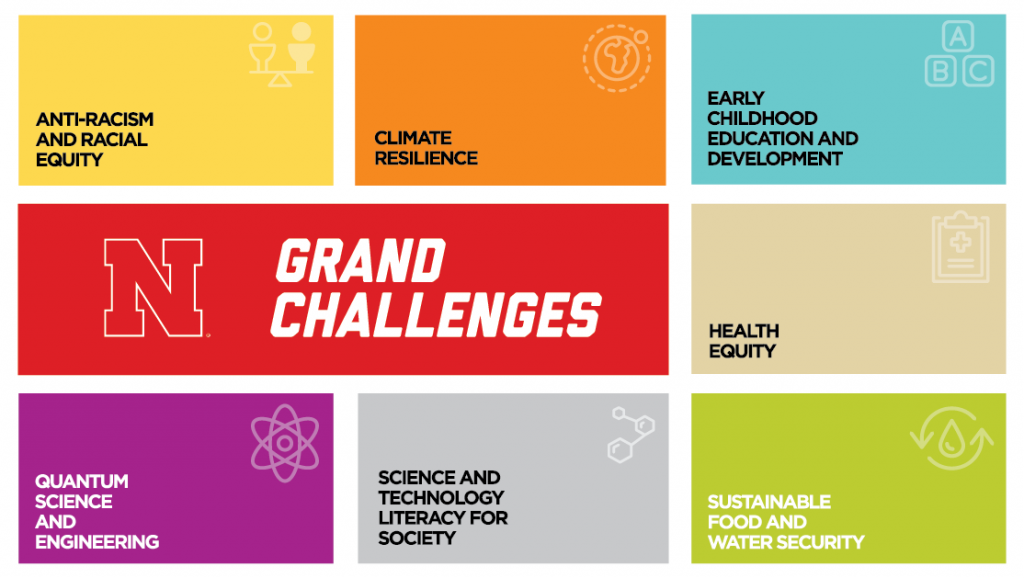A steering committee has been assembled to guide the next steps of the University of Nebraska–Lincoln’s Grand Challenges process. Members were selected to represent a cross-section of faculty and staff to represent all corners of campus and were approved by the Chancellor’s Executive Leadership Team.
The steering committee members are: Trey Andrews III, psychology; Tala Awada, School of Natural Resources; Christian Binek, physics; Brittany Duncan, computer science and engineering; Megan Elliott, Johnny Carson Center for Emerging Media Arts; Shane Farritor, mechanical and materials engineering; Nkenge Friday, Office of Diversity and Inclusion; Rachael Herpel, Daugherty Water for Food Global Institute; Sherri Jones, education and human sciences; Sarah Karle, architecture; Elizabeth Lorang, University Libraries; Elsbeth Magilton, law; Jennifer Nelson, Office of Research and Economic Development; Charles Chioma Nwaizu, food science and technology; Angie Pannier, biological systems engineering; Mark Riley, engineering; Clinton Rowe, earth and atmospheric sciences; Susan Sheridan, Nebraska Center for Research on Children, Youth, Families and Schools; Shari Stenberg, English and women’s and gender studies; William Thomas, history; Shari Veil, journalism and mass communications; and Rick Bevins, interim associate vice chancellor for research, Nathan Meier, assistant vice chancellor, and staff members Lisa Maupin, Heidi Uhing and Ashley Washburn, all of the Office of Research and Economic Development.
“This committee will serve as a bridge from the N2025 Strategic Plan to the development of a process for implementing our Grand Challenges,” said Bevins, committee co-chair. “In our first meeting, it was clear that the members care deeply and will work hard to ensure success.”
The strategic plan calls for Nebraska to establish a culture committed to increasing the impact of research and creative activity and to focus research, scholarship, creative activity and student experiences to foster innovative, interdisciplinary endeavors and solve challenges critical to Nebraska and the world.
Last year, Chancellor Ronnie Green charged ORED with creating a process to identify a series of grand challenges that Nebraska is uniquely positioned to solve. Grand challenges are large societal problems whose solutions require a combination of transformative, interdisciplinary approaches.
More than 500 faculty, staff, students and emeriti helped identify the challenge themes: anti-racism and racial equity; climate resilience; early childhood education and development; health equity; quantum science and engineering; science and technology literacy for society; and sustainable food and water security. Descriptions of these themes are available on the Grand Challenges website.
A series of fall events will provide opportunities for faculty, staff and students to share goal-based project proposals and form inclusive new teams to develop innovative, high-impact funding proposals for work related to the grand challenges. Plans are forthcoming.
To this end, Chancellor Green and Bob Wilhelm, vice chancellor for research and economic development, have pledged to make a significant investment over the next four years to be leveraged for securing sustainable external funding and create impactful scholarship and deeper engagement with the community and external partners in order to accomplish the grand challenge goals.






